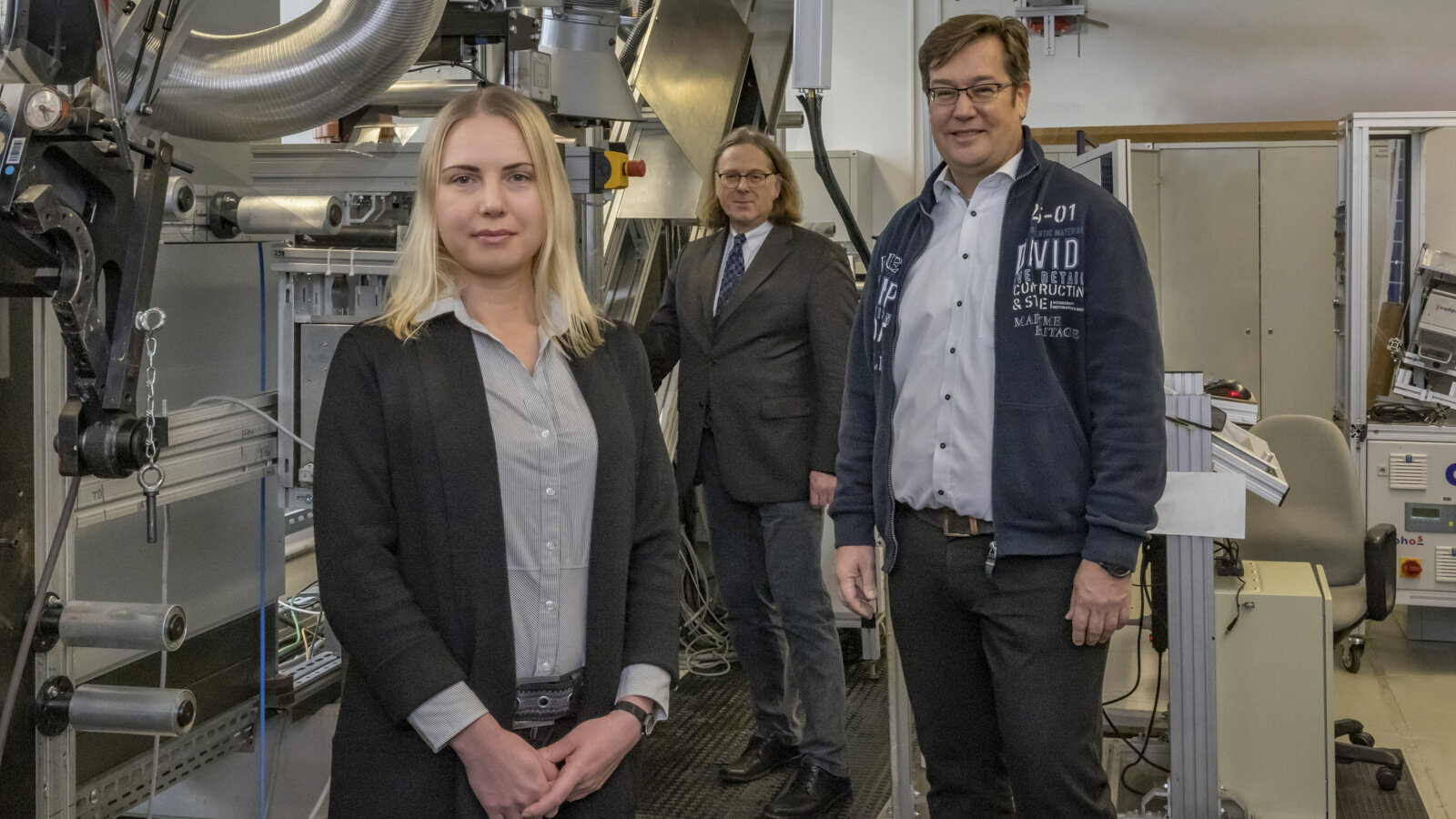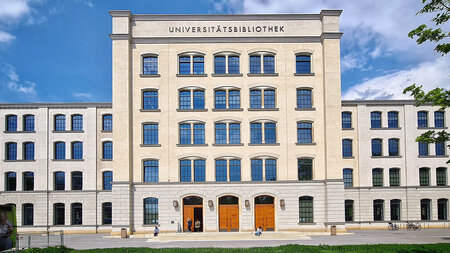DFG Establishes Research Unit on Printed Solar Cells under the Leadership of Chemnitz University of Technology
The German Research Foundation (DFG) has approved the establishment of the research unit "Printed & Stable Organic Photovoltaics with Non-Fullerene Acceptors" - Spokesperson of the project, which is funded with around five million euros, is Prof. Dr. Carsten Deibel from the Institute of Physics at Chemnitz University of Technology
-

Prof. Dr. Carsten Deibel (r.) and Maria Saladina (Professorship of Optics and Photonics of Condensed Matter, in particular Sensor Systems and Analytics ) and Prof. Dr. Arved C. Hübler (head of the Professorship of Printed Media Technology) conduct research together in a laboratory where solar cells can be printed. Photo: Jacob Müller
The German Research Foundation (DFG) is establishing the new research group "Printed & Stable Organic Photovoltaics with Non-Fullerene Acceptors - POPULAR" under the leadership of Chemnitz University of Technology. This was decided by the DFG's Joint Committee on December 8, 2022. According to the DFG, the research unit will be funded with 5.047 million euros in the first four-year funding period - including approximately 3.255 million euros at Chemnitz University of Technology. The spokesperson is Prof. Dr. Carsten Deibel, head of the Professorship of Optics and Photonics of Condensed Matter, in particular Sensor Systems and Analytics at Chemnitz University of Technology.
"I am very pleased about the establishment of the DFG research group 'POPULAR' under the leadership of Chemnitz University of Technology - which is the second research unit at the Faculty of Natural Sciences. This is not only an outstanding success for all those involved and the Faculty of Natural Sciences, but also for our entire university. I would like to congratulate Dr. Deibel and everyone else involved and thank him and his team for their great commitment. I am very sure that the research unit will contribute significantly to strengthening the core competence of Materials and Intelligent Systems as well as its visibility at Chemnitz University of Technology and far beyond," said the President of Chemnitz University of Technology, Prof. Dr. Gerd Strohmeier.
The future research work of the interdisciplinary DFG research unit will focus on the production and investigation of printed efficient organic solar cells. "These carbon-based materials and the photovoltaic devices made from them are currently the subject of intensive research worldwide, as they have the potential to be manufactured quickly and with comparatively little energy input," explains Deibel. A major advantage of the materials used is that they are easy to use in "printing inks". This means that, in the future, solar cells can be printed very cheaply in large quantities, similar to newspapers. "However, the durability of the cells is still a problem, so the research unit is investigating completely new approaches here," explains Prof. Dr. Arved C. Hübler, head of the Professorship of Printed Media Technology, whose team, together with the printing technology laboratory of the Faculty of Mechanical Engineering at Chemnitz University of Technology, forms the interface with manufacturing technology. Deibel adds, "The goal of our DFG research unit is therefore to manufacture organic solar cells using printing processes suitable for mass production and to understand and improve them with complementary experiments and simulations." Maria Saladina, a research assistant at his professorship explains, "This collaborative project is also a fascinating opportunity to establish yourself as a young scientist in the scientific network of a pioneering research field."
The research team has a cross-university composition. Chemnitz University of Technology is represented by scientists from the Professorship of Optics and Photonics of Condensed Matter, in particular Sensor Systems and Analytics (Head: Prof. Dr. Carsten Deibel), the Professorship of Semiconductor Physics (Head: Prof. Dr. Dietrich R. T. Zahn), the Professorship of Polymer Chemistry (Head: Prof. Dr. Michael Sommer), the Professorship of Printed Media Technology (Head: Prof. Dr. Arved C. Hübler), the Professorship of Scientific Computing (Head: Prof. Dr. Martin Stoll) and the Professorship of Inverse Problems (Head: Prof. Dr. Jan-Frederik Pietschmann). They cooperate with researchers at the Universities of Dresden (Chair of Emerging Electronic Technologies), Bayreuth (Junior Professorship of Dynamics and Structure Formation), Erlangen-Nuremberg (Chair of Materials for Electronics and Energy Technology), Potsdam (Chair of Soft Matter Physics and Optoelectronics and the group of Optoelectronics of Disordered Semiconductors), Heidelberg (Chair of Scientific Computing and Optimization), and in Durham, UK (Department of Engineering).
For further information, please contact Prof. Dr. Carsten Deibel, tel. +49 371 531-34878, e-mail deibel@physik.tu-chemnitz.de, popular-printed-photovoltaics.de.
Multimedia: In the podcast series "TUCscicast" of Chemnitz University of Technology, the episode "Organic Solar Cells and Photovoltaics in Germany" (Season 1, Episode 8) with Prof. Dr. Carsten Deibel and further background on his research is available.
(Author: Mario Steinebach / Translation: Brent Benofsky)
Matthias Fejes
15.12.2022





